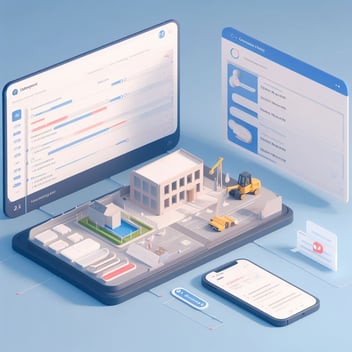In my last article, I talked about the main organizational differences between small and large contractors. In case you missed it, check it out here.
As I mentioned, larger contractors tend to avoid having their PMs manage multiple projects unless they have the support structure to do so. On the other hand, smaller contractors tend to take the opposite approach, where emphasis is placed on winning more projects to increase revenue, regardless of their workload.
Either way, there will always be times in a PM or Supervisor’s career where they are faced with having to manage multiple projects at the same time. I’ve experienced this struggle many times in my career so I know exactly how challenging it can be.
Managing multiple projects means that you’re constantly juggling between various project activities, deliverables, deadlines, clients, and stakeholders. If not managed effectively, the quality of work tends to suffer and problems quickly start adding up. This is especially true during the peak seasons, where RFIs, SIs, procurement, and other various construction documents quickly pile up across the board. It's hard to breathe sometimes!

Throughout my career, I've managed to compile a list of crucial tips that have helped me manage multiple projects effectively. Without further ado, let's dive in!
Tips on How to Manage Multiple Projects Concurrently
1. Don’t Multi-task
This may sound counterintuitive, especially considering that this article is about managing multiple projects at once. However, there are several studies out there which prove multi-tasking is actually less productive than focusing on one thing at a time. This is likely due to the fact that you’re more likely to enter a ‘flow’ state while devoting your entire focus on one task at a time, allowing you to complete it not only faster, but also more accurately.
2. Plan, Collaborate, and Plan Some More

“Before anything else, preparation is the key to success.” - Alexander Graham Bell
This can’t be stated enough. A project is only as good as the plan behind it, and without a good one, it is impossible to guarantee success. This especially holds true when dealing with multiple projects.

Before every project, it is essential to come up with a detailed plan together with your team and stakeholders to ensure that everyone is on the same page. This includes risk management, resource management, time tracking, capacity planning, communications, contingency plans and much more. Ideally this planning is non-stop, and should be common practice throughout the life of the project.
3. Organize Everything and Everyone
It is easy to get bogged down when you’re working on a multitude of projects. The key to success in this case is organization. It is impossible to have a productive day, week, or month without an organized workspace for both yourself and your team. It is essential to organize things like construction & project documents in a universal methodology across your organization so that there is no confusion when trying to access specific documents.
Organizing your team and the roles and expectations of each member is also another extremely important activity. Using tools such as RACI matrices can provide an easy resource for anyone to quickly view who is responsible for what.
4. Have Visibility Across All Your Projects

There is nothing worse than spending valuable time having to scramble to find important project information because of the lack of visibility or no unified structure across all your projects. If you follow the same convention across all your projects, jumping from one project to the next will be a much smoother process.
Visibility doesn’t just stop there though. With today’s era of technology, it’s even easier for managers to get detailed insights into what is going on in ALL their projects. This is especially true through the use of a construction project management software. Managers don’t need to be at a job site to know what is happening, and technology is just getting started in construction and is a great way to hack your productivity and profitability.
5. Learn to Prioritize
6. Delegate
Communication is key and progress updates should be a staple for you to keep track of things you no longer oversee.
7. Say No & Avoid Distractions
If presented with an order from a superior to do something, it is essential to communicate with them and perhaps ask them what they would like for you to drop in order to work on what they are asking. Oftentimes you’ll find they will look elsewhere when presented with your current workload and priority list.
8. Always Finish at Least 1 Important Task per Day

Moral victories are huge and help keep the momentum going from day to day. Therefore it is essential to not bite off more than you can chew, and break down larger tasks into smaller ones. This way you can take in those small wins and cross off the smaller tasks as you go along.
9. Make Use of Software
Luckily there are newer software companies out there which can provide automations on top of their project management layers. This is huge because it can allow PMs to directly set up and manage their project-specific workflows, allowing them to sit back and focus on planning while the machine does all the tedious manual entry work.

When exploring software, it's important to make sure you select the right type of software for your needs. Don't just adopt what the contractor next to you is using, because their internal structure and use-case for the software could be very different from yours. I would also highly recommend avoiding any solutions that require too much manual entry. If you deploy a solution that still requires you to manually update the data, the value you will get from the software can end up being minimal in the end.
The most exciting new software in the industry right now is Construction Workflow Automation (CWA). With CWA, you will be able to eliminate manual entry and have the software essentially act as your project management assistant which takes care of a lot of the tedious and repetitive tasks for you.
Closing Remarks
With companies like Ontraccr continuously improving their feature-set and automation layers, it's starting to become a no brainer in terms of adopting technology to help!






